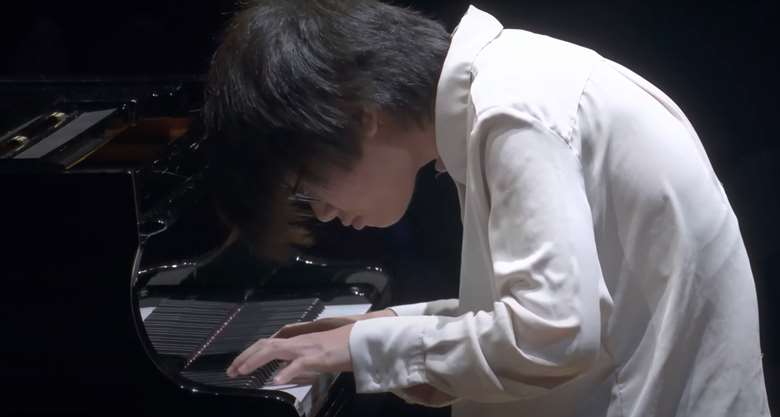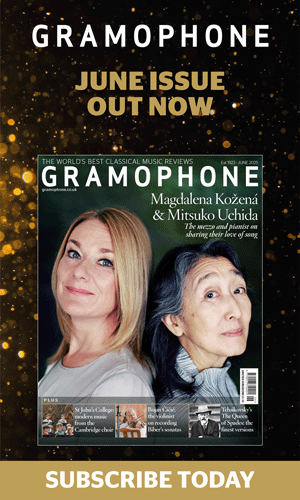Jed Distler's Cliburn Blog No 2: Playing what they love
Jed Distler
Friday, May 23, 2025
'Not since Alfred Cortot and, more recently, Francesca Libetta have I heard Saint-Säens served up with such boundless imagination and character, not to mention transcendental virtuosity'

When an interviewer asked the Cliburn’s 28 selected candidates to explain their solo round repertoire choices, nearly every one of them replied ‘I’m playing what I love’, or words to that effect. Obviously no one is going to confess to playing what their teacher suggested, or admit that they’ve picked pieces deemed most likely to pique a jury member’s attention. Yet given the wide repertoire array and smart programme building that will prevail through the solo rounds, we should give the pianists the benefit of the doubt.
Regarding today’s first two contestants, I must disclose that I wrote letters of recommendation on their behalf, having voted for them while adjudicating competitions in which they participated. Although Jonas Aumiller was the 2024 Rina Salo Gallo Competition second prize winner, I voted to place him first. He consistently channels his remarkable virtuosity towards musical ends, while never making an ugly sound. I thought it strange of him to commence with Scriabin’s B minor Fantasy, Op 28 – hardly a usual concert opener. Still, Aumiller’s keen polyphonic acumen and eloquent sense of direction transformed Scriabin’s amorphous piano-writing into a tightly argued masterpiece. The terraced dynamics and witty contrapuntal interplay in Bach’s G minor Toccata have rarely sounded so comfortable and fitting on a modern concert grand. Aumiller painted Chopin’s Barcarolle in muted tones and a thousand dynamic shadings, with the phrases easily sailing over the bar lines. And what cogency and meaning he brought to the coda’s complex textural web. The curvaceous transparency of Schumann’s Presto passionato was another revelation. In this context, Aumiller’s full-throated and line-orientated interpretation of Gabriela Montero’s Rachtime (the competition’s required commissioned piece) seemed to pick up where Schumann left off, without any of the Rachmaninov-like traces we heard from yesterday’s performers.
Watch Jonas Aumiller's performance:
Prior to my judging the Royal College of Music’s prestigious Chappell Medal Competition last year, a colleague told me that I’d immediately know who I’d choose as the winner. ‘Just two or three bars of music, and you’ll understand what I mean.’ I broached his comment skeptically, but he was absolutely right, for Magdalene Ho’s special qualities triggered an immediate and unanimous first prize verdict. She had also won the Clara Haskil International Piano Competition in 2023. Fast forward to Fort Worth, where she launched into Bach’s D major Toccata with obvious care and forethought. Her dynamics seemed more constricted than usual at the start – was it caution or a slight case of nerves? But the pianist warmed up for a sprightly and eloquent Fugue, setting the stage for a searching and deeply felt journey through Franck’s Prelude, choral et fugue, where every note sang and spoke. Her Rachtime explored linear independence and made arrestingly dramatic effect of the rests in a performance full of profile and personality. Not since Alfred Cortot and, more recently, Francesca Libetta have I heard Saint-Säens served up with such boundless imagination and character, not to mention transcendental virtuosity. Should this gifted pianist progress to the Semi-finals, we’ll get to hear her Schumann Davidsbündlertänze, which I’d venture she plays better than anyone today. I’m not exaggerating!
Magdalene Ho:
The 20-year-old Ukranian pianist Roman Fediurko’s musical orientation markedly differs from Aumiller and Ho. Opening with the G sharp minor Prelude and Fugue from Book 2 of Bach’s Well-Tempered Clavier, Fediurko’s rapid, neo-Glenn Gouldian Prelude contrasted to a Fugue marked by tapered phrases and little holdbacks that evoked such ‘old school’ Bach pianists as Edwin Fischer and Samuil Feinberg. In Fediurko’s hands, Rachtime was all about virtuoso flair, as revealed in those tell-tale crescendo flare ups and karate-chop alternating chords. As a Rachmaninov stylist, Fediurko’s somewhat flinty tone and emotive projection made me think of Horowitz. Listen again to the pianist’s smoldering legato in the Elégie, or the Second Sonata’s galvanic runs and pulverising accents cutting through the composer’s textural thickets like a powerful snake unclogging a stuffed-up drain. Pure, unadulterated Volodya, so to speak, yet to quote Jerry Seinfeld, ‘Not that there’s anything wrong with that!’
Roman Fediurko:
24-year-old Mikhail Kambarov from Russia first caught my attention when he won the International Scriabin Competition in Grosseto, Italy, in 2023, following an excellent performance of the Scriabin Piano Concerto (available on YouTube). He cultivates a warm sonority and understands how to scale his wide dynamic range in the present concert venue. His underlinings in Chopin’s Third Ballade belaboured the obvious, and he fidgeted with the rhythmic build-up in the final pages. Conversely, a similar ‘stop-go’ sensibility befit Rachtime, which abounded in chiaroscuro detailing and lots of interesting left-hand detaché articulation. Had Josef Hofmann or Shura Cherkassky lived to play Rachtime, it might have sounded something like Kambarov’s. The pianist’s veiled lyricism and multi-coloured touch in Scarlatti D minor Sonata, Kk213, provided a fitting bridge to the ‘La folia’ theme from which Rachmaninov’s Corelli Variations follow. I found his interpretation lacking simplicity and momentum in its preoccupation with inner voices and occasional rhythmic contortions.
Mikhail Kambarov:
Some years ago I met the husband-wife pianist luminaries Murray McLachlan and Kathryn Page, as well as their pianist offspring Rose and Matthew. But I hadn’t encountered their older pianist son Callum McLachlan until his Preliminary Round performance here – although he made the Semi-finals in Leeds last year. As they say, the apple doesn’t fall far from the tree. Piano mavens familiar with the combination of dry-point etching and watercolour dabs informing the classic Clara Haskil and Sviatoslav Richter recordings of Schumann’s Waldszenen may find a kindred spirit in McLachlan. I especially loved his pliable, airborne take on ‘The Prophet Bird’. In contrast to the many fanciful Rachtime performances we’ve been hearing, McLachlan’s seemed relatively straightforward and, so to speak, ‘by the book’. In the Barber Sonata, McLachlan’s refreshingly fast and forthright approach to the first movement shed rare light on its rhythmic structure, bringing out the music’s inherent classicism. A light and lilting Scherzo led to a Passacaglia where McLachlan’s luminescence contrasted to Philipp Lynov’s darker, heavier interpretation on day one. Clarity and balance predominated throughout the Fugue, even in the massive chords and treacherous leaps that young pianists tend to pummel to smithereens.
Callum McLachlan:
In terms of sheer proficiency, studious preparation and tasteful musicianship, one could hardly fault the 26-year-old Chinese pianist Jiarui Cheng’s ambitious offerings. He nailed the interlocking octaves in the Saint-Saëns/Liszt/Horowitz Danse macabre – as scintillating as the master – while you could take dictation from his Scriabin Fifth Sonata. Yet I found much of Cheng’s pianism colourless and uneventful, save for genuinely poetic touches in the Brahms A major Intermezzo, Op 118 No 2.
Jiarui Cheng:
What a difference when 25-year-old Piotr Alexewicz’s fuller-bodied Medtner Sonata-Elegy in D minor filled the hall with burnished sonorities at all dynamic levels. This pianist equally inhabited Brahms’s E flat minor Scherzo, Op 4, which conveyed palpable tension and release, as well as showcasing Alexewicz’s effortless octave technique. Such octaves stood Alexewicz in good stead in Liszt’s Dante Sonata, a work that he treats more as an orchestral tone poem than its latter-day incarnation as an overplayed competition staple. Only the relatively heavy-handed and bland Rachtime disappointed in Alexewicz’s otherwise distinctive Preliminary Round set.
Piotr Alexewicz:
After a long break, festivities resumed with 28-year-old Canadian Alice Burla. The outer movements in her Haydn G major Sonata, Hob.XVI:6, sported dazzling definition and crispness, albeit to earnest rather than graceful effect. I had the same reaction to her scrupulous yet somewhat foursquare Ligeti ‘Fanfares’. Her vertically orientated Rachtime mostly focused on the top line. Happily, Burla loosened up in the Barber Sonata, where the first two movements stood out for pliable and nimble fingerwork.
Alice Burla:
As a Haydn stylist, I much preferred Yanjun Chen and her heftier yet more communicative E major Sonata, Hob.XVI:31. Her rounded and genuinely expressive Medtner Canzona serenata (Op 38 No 6) starkly contrasted to the brute force, demonic drive and orchestral array of colours she elicited from Shostakovich’s early First Sonata. Her riveting performance proved one of the day’s high points. Chen totally got Rachtime’s internal ‘swing’ and patches of humour, if not matching the assured fluency we have heard from others.
Yanjun Chen:
At 30, Jonathan Mamora is a seasoned collaborative pianist and esteemed church musician, and a top-notch soloist. He began the day’s final Preliminary Round set with a selection from David AT Önaç’s Five Etudes. These pieces exploit the instrument from top to bottom, and provide an ideal vehicle for Mamora’s unassailable technical authority and huge sound. By contrast, he scaled Bach’s B flat minor Prelude and Fugue from Book 2 of The Well-Tempered Clavier down to size, taking a relaxed tempo in the Fugue that allowed the composer’s extraordinary chromatic invention ample breathing room. Playing from memory, Mamora strove less for effect than others in Rachtime, yet as a consequence his interpretation seemed more organic and shapely. But his honest and beautifully modulated yet overly literal and underplayed Scriabin Fifth Sonata with which he closed was a bit of a letdown, considering the power and force that this pianist brought to the Önaç Etudes.
Jonathan Mamora:
Gramophone is a Media Partner of The Cliburn International Piano Competition









